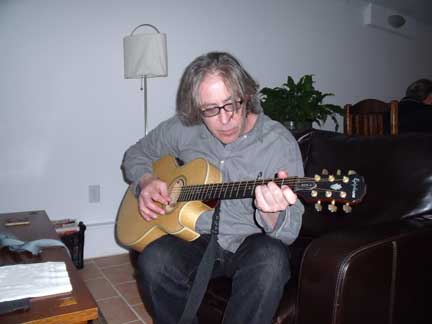When Grows Go Bad
 Wednesday, February 9, 2011
Wednesday, February 9, 2011 Here's a story about unreal estate that could only happen behind the Green Curtain.
Only in Mendo, where your business is your own and few questions are asked on a good day, could a story like this happen. I thought only in Mendocino County could three tattooed guys rent 50 acres to legally grow marijuana from a guy who didn't own the land. That is, until I found out how long this one guy's been doing it. Now I can only wonder how many more are out there.
Welcome to the Era of Grassnost -- living in the times when marijuana seems legal, but it isn't. You're allowed to grow it; you just can't sell it.
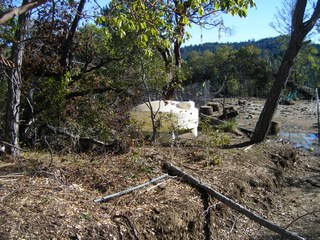
While others are cautious and plodding, sitting on massive stashes, waiting for the market to recover from the hope and promise that never came with Proposition 19, there are your Wall Street Growers who snake and slither towards the power and money that comes with growing high-grade bud these days.
And sooner or later, if they're growing outdoors, all roads lead to the Emerald Triangle. That is, if you want to grow legally. And you can; you just have to have the correct paperwork and, of course, the right spot to grow your millions.
Bringing us back to the axiom of life that every business person knows -- location, location, location -- meet Lew Lindsey, unreal estate agent extraordinaire (not his real name).
By humble accounts, there are thousands and thousands of citizens growing marijuana in the hilly, woodsy country starting north of Cloverdale (about 100 miles north of San Francisco) and reaching east and west and stretching up all way to Oregon and the heavens beyond.
The Mendocino County Health Department has made broad inroads concerning marijuana. In an effort to bring illegal growers out of the shadows while legislation moves progressively forward, Sheriff Tom Allman created the Zip-Tie Program, a process where medical growers can sign up with the Sheriff's Department, register their grow, and receive zip-ties at $65 apiece.
Because they are growing for established medical marijuana dispensaries, it's all legal. It took guts on the sheriff's part to create the program and it took even more intestinal fortitude for growers to come forward after years of hiding in the shadows to say, "Hey, yes, in fact I am a marijuana grower. Where do I sign up?"
With so many people trying to usher in a new era of marijuana, trying to do the right thing, trying to make sure there is safe access for any patient that wants medicine, law enforcement officials have the responsibility to make sure the growers' rights are protected. In a situation that is already precarious, you don't need human tools like Lew Lindsey screwing it up for the rest of us.
Some may say you can't stop greed. But if we want to get to the next level, we, the movement, have to stop the Lew Lindseys of the world.
Dollar Signs In Their Eyes
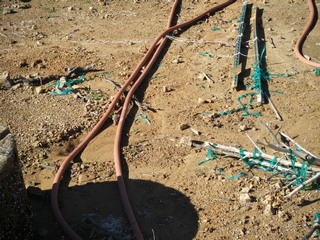
The three young prospectors coming from San Francisco couldn't believe their good fortune. They had more than the $100,000 needed to start their special grow, especially for what they had in mind. They had dollar signs in their eyes as big as the Hollywood sign, the place they would be unloading their cannabis in November.
All they had to do is make it through the spring, summer and early fall, then they would be rich young men. They had the backers, the DVD's for growing, plus they had a "thumb," an in-house expert grower that they hired for the summer. Trailers, tents and other supplies were set to be delivered as soon as they found that perfect spot.
These young men represent a trend that has always been a part of the Northern California landscape -- the Wall Street growers. Those Fast Buck Freddies who think they can turn a crop over for quick profits and have little regard for the medicine or for the land. In the parlance of most organic growers, "They grow without Love."
Since these ganja opportunists think they have great clones or imported seeds, plus the bucks to grow, all they need now is a guide to show them where to place their golden seeds.
Lew Thinks He's A Playa
For Lew Lindsey, life is a sloppy fresh strawberry ready to take a bite from. At 68 years young, in his silk-screen imprinted hip-hop jeans with old man bright tri-color suspenders, he flashes a smile with a line of talk that would make Jay-Z vomit.
Lew not only thinks he's a playa, but he knows it. For all the shady deals that are made in the darkness of the redwoods, Lew's bony fingers are in many of them, especially if there is a way to rip someone off. He'd even take the locals, which is pretty much unheard-of, even by Trinity standards.
With his young Internet-ordered companion at his side, Lew works the Triangle with a history of bad land deals, bad truck deals, and pretty much being unscrupulous to whomever he meets. But he's not that much different than many of the gentleman growers of the area concerning his one big dream. Just one big score, then hello Thailand! The same thing Lew's been saying for years at the beginning of every season: "One more score, then I'm outta here!"
But Lew Lindsey is greedy. The well is running and it doesn't look like it's going to be dry for some time. His emails were full of eager dudes looking for real estate to grow on. When he rented the land to the two previous tenants, nothing went wrong. Why would this time be different?
It was almost a no-brainer. The cops have sanctified it. The tenants paid cash up front. Hell, the police even visited the grow twice, setting up a strong chain-link fence across the entry drive to make sure the grow was safe.
Just one more summer and then he was out of here.
Scraping The Hills
The three Wall Streeters couldn't believe their luck. Not only had the old man done them a solid on the land, but someone before them had started to carve a road into the side of their mountain, leading down to a natural spring needed for the watering of their plants.
This hearty bunch wasn't going to be deterred like the previous growers. With their capital investment funds, they were able to bring in bulldozers and other heavy-duty equipment and build this road right.
Scraping the hills, digging up deer trails that have been there for eons, the growers shaped and manipulated the land for their one seasonal need.
Because the hills were too sharp and steep, the road never worked, so they left it uncompleted. Instead, two 5,000-gallon reservoir tanks were dropped and filled by the local water merchants.
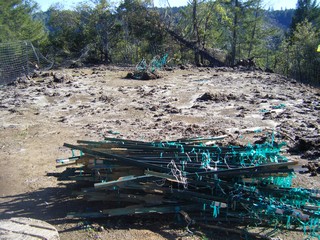
The same was done with fencing, tubing and hoses and all the housing, all provided by locals who support this industry. And why not? Wall Street growers had gone to the Sheriff's Department, registered, and had all their paperwork and permits on full view for anyone to see.
They were legal. This was a legal grow.
The Wall Streeters made it through the summer. They erected a military canvas tent, 50x50, to cure and trim in. They set up the fans and blowers. Now, all they needed was trimmers.
Most inhabitants of what is called the Emerald Triangle live up there for a variety of good reasons. While growing dope might be high on the list for some, others just want their privacy.
Solitude and seclusion are intrinsic components to Northern California living. If they wanted to see people, they'd live in a city.
Most people can claim a mountaintop to themselves or they share the view with a few others that have lived next to them, whom they possibly barely know except for emergency situations. The word "neighbor" is used loosely up here. It might take five years or more before neighbors begin to talk and trust each other.
When the Wall Streeters brought in trimmers, the unknown laborers who take the wild and uncut marijuana flower tops and groom them into delicious, shapely looking buds, primed for distribution, eyebrows were raised. Because the Wall Streeters weren't part of the local scene, they had to hire the trimmers literally off the street.
Now the population of the mountaintop increased from "a few" to "too many." Neighbors began to arm themselves because of all the unknowns that could happen. After living for decades in almost total seclusion, residents near the Wall Streeters hung privacy fences and draped their compounds so prying eyes couldn't see in.
With so much on the line, and a balance that has been made plumb by years of dedicated work and by locals keeping to themselves (much like the Appalachian moonshiners did in their day), the Wall Streeters were wrecking the harmony of the mountain.
The new kids on the block were threatening a quiet, secluded lifestyle that had been there for years before the Greedheads' arrival, and would be there years after the later summer departures.
Fall came and the Wall Streeters' industrial grow became silent. They were gone. All the residue of their business and craft was left behind. The only thing they took with them was their crop.
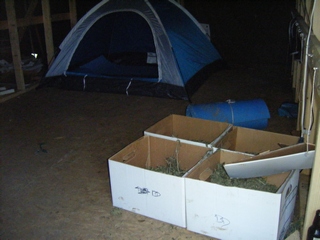
Even the "larf" -- leaf and partial flower tops trimmed from the buds -- was left behind.
Even the "larf" -- the leaf and partial flower tops that are trimmed and placed into a bucket or box for future uses like hash-making or for edibles -- was left behind.
It was like a ghost town of empty trailers with garbage and unused garden supplies left strewn everywhere. Because the growers left their beer and soda pop empties piled high in a trash barrel, the local bear population had their way with the campsite.
The windows to the trailers are sliced open like a sardine can. Plastic containers that held the compounds and the magic "organic" grow formulas lay like cobblestones forced into the earth.
It looked almost like a massacre had happened moments before. The damage that was left behind was horrifying.
And some people don't care where their dope comes from.
Rich, Golden Land
There used to be a lot of land available in Northern California, some years back. I know a few who bought some small parcels in the Seventies, sending a few dollars every month to a p.o. box and now own their own place. Others got rich via the Web and bought land that way.
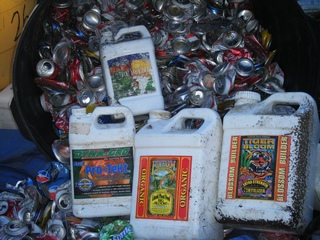
But for the most part, it is old lumber or railroad families that divided up NorCal, owning a majority of acres and acres of rich, golden land -- land that goes back to the Gold Rush and has been in the family's portfolio for generations.
This area has been fought over for years. From the genocide of local Natives to the turbulent timber industry disputes and the days of spotted owl hunting, people take their land very seriously.
That's why locals didn't grow marijuana on their own property. They could lose everything -- house, land, and family -- if they got busted. So you grew on other people's land. If the law was onto you, you could just move.
This is another reason why the Sheriff's Department's introduction of the zip-tie program is a huge advancement. It allows growers to grow on their own land, legally.
On the other side of the fence, this is also why local Republican gentry -- whose families have resided in the hills of Northern California for eons -- hate marijuana growers. It's because of what the marijuana growers have done to their property with seemingly such little regard for the land -- end of story.
That's why a marijuana grower called the real owner of the land that the Wall Streeters grew on, and apprised him of the situation.
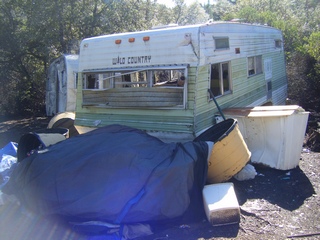
Needless to say, the actual landlord was livid beyond words. Not only had he no knowledge of the scamming bogus real estate agent, it had happened three times, for three consecutive years.
But beyond the embarrassment of the scam, the land was ruined. For at least a hundred years, the topsoil and the mycelium layer that protects the ground and allows for renewal and rebirth have been destroyed. The ancient redwoods and rare Madera trees that were cut down for more open sunshine are gone.
The trees and brush that were cleared for the grow are bundled at the foot of a canyon. By the end of next summer, that area, full of discarded wood and brush, will be dried out under a burning sun and soon will be a tinderbox, ready to explode.
The Weed Field and the Damage Done
It is really impossible to calculate the damage this type of grow can cause.
There are so many victims in this scenario, it's hard to know where to start. The actual landlord/owner of the property; he's responsible for the clean-up and all the damage left behind. The Sheriff's Department; they issued permits because of correct paperwork that showed erroneous land coordinates.
And, of course, the land itself.
The growers thought they had a legal grow, even though they left the area devastated. They should be found and sued for the land mismanagement they caused, and then some.
And the there's Lew Lindsey. He needs to be stopped. The guy is no stranger to the court system, but always seems to squeak through somehow.
He's attempting to bring down a fragile eco-commodity arrangement that is just in its infancy. There are Lew Lindseys everywhere there's a quick buck to be scammed.
He has nothing to do with medical marijuana or the movement. He's just a greedhead.
The Fix
Most authentic real estate agents in the North Country carry a GPS to know where they are. They use them to check property lines and boundaries. That's all law enforcement needs to do to verify if a marijuana grow is actually where it is supposed to be, as stated in the paperwork. It's a learning process.
There are permitted green growers who work in concert with the Earth. They don't shape the landscape -- they work with the curves and bends.
They use rainwater for watering, and grow above the soil, not damaging the ground.
Patients who need their medicine clean and green don't have to worry. It can be done.
